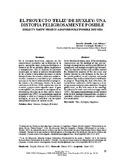Mostrar el registro sencillo del ítem
El proyecto ‘feliz’ de Huxley: una distopia peligrosamente posible
| dc.rights.license | http://creativecommons.org/licenses/by-nc-sa/3.0/ve/ | es_VE |
| dc.contributor.author | Briceño-Montilla, Luis Alfonso | |
| dc.contributor.author | Barrios-Uzcátegui, Roselia C. | |
| dc.date.accessioned | 2021-12-12T18:09:20Z | |
| dc.date.available | 2021-12-12T18:09:20Z | |
| dc.date.issued | 2021-12-12 | |
| dc.identifier.uri | http://www.saber.ula.ve/handle/123456789/47783 | |
| dc.description | Briceño-Montilla, Luis Alfonso: http://orcid.org/0000-0001-6713-1070 | es |
| dc.description | Barrios-Uzcátegui, Roselia C.: http://orcid.org/0000-0002-0190-1279 | es |
| dc.description.abstract | En la distopía huxleana, algunas de las características resaltantes son la abolición de la guerra, manipulaciones psíquicas-biológicas e instauración de un gobierno global hegemónico y omnipresente. Así, el objetivo del presente ensayo gira en torno al análisis interpretativo de los aciertos y desaciertos presentes en dicha distopía, frente a las actuales condiciones políticas, sociales, económicas y mediáticas que confirman una especie de nuevo orden mundial en progreso. En cuanto a las reflexiones finales, la reciente conferencia de Davos (2020) expone una serie de acuerdos y proyecciones signadas como ‘el gran reseteo global’, en consonancia con algunas de las advertencias descritas en su obra: nueva visita a un mundo feliz (1985). La metodología implícita utilizada se sitúa en el campo de la hermenéutica analógica, en aras de contribuir con un aporte interpretativo teórico de carácter social. | es_VE |
| dc.language.iso | es | es_VE |
| dc.rights | info:eu-repo/semantics/openAccess | es_VE |
| dc.subject | Guerras | es_VE |
| dc.subject | Distopía | es_VE |
| dc.subject | Felicidad | es_VE |
| dc.title | El proyecto ‘feliz’ de Huxley: una distopia peligrosamente posible | es_VE |
| dc.title.alternative | Huxley’s ‘happy’ project: a dangerously possible distopia | es_VE |
| dc.type | info:eu-repo/semantics/article | es_VE |
| dcterms.dateAccepted | Junio-2021 | es |
| dcterms.dateSubmitted | Marzo-2021 | es |
| dc.description.abstract1 | In the Huxlean dystopia, some of the outstanding characteristics are the abolition of war, psychicbiological manipulations and the establishment of a hegemonic and omnipresent global government. Thus, the objective of this essay revolves around the interpretive analysis of the successes and failures present in said dystopia, in the face of the current political, social, economic and media conditions that confirm a kind of new world order in progress. Regarding the final reflections, the recent Davos conference (2020) exposes a series of agreements and projections marked as ‘the great global reset’, in line with some of the warnings described in his work: new visit to a happy world(1985). The implicit methodology used is situated in the field of analogical hermeneutics, in order tocontribute a theoretical interpretive contribution of a social nature. | es_VE |
| dc.description.colacion | 39-56 | es_VE |
| dc.description.email | revistacifranueva@gmail.com | es_VE |
| dc.description.email | ciudadbohemia1@gmail.com | es_VE |
| dc.description.email | chelybu@hotmail.com | es_VE |
| dc.description.frecuencia | Semestral | es |
| dc.description.paginaweb | http://www.saber.ula.ve/cifranueva/ | es |
| dc.identifier.edepositolegal | ppi 201202ME4019 | es |
| dc.identifier.eissn | 2244-8438 | es |
| dc.publisher.pais | Venezuela | es_VE |
| dc.subject.facultad | Núcleo Rafael Rangel (NURR) | es_VE |
| dc.subject.institucion | Universida de Los Andes | es_VE |
| dc.subject.keywords | Wars | es_VE |
| dc.subject.keywords | Dystopia | es_VE |
| dc.subject.keywords | Happiness | es_VE |
| dc.subject.seccion | Cifra Nueva: Artículos | es_VE |
| dc.subject.tipo | Revistas | es_VE |
| dc.type.media | Texto | es_VE |
Ficheros en el ítem
Este ítem aparece en la(s) siguiente(s) colección(ones)
-
Cifra Nueva - Nº 044
Julio - Diciembre 2021


